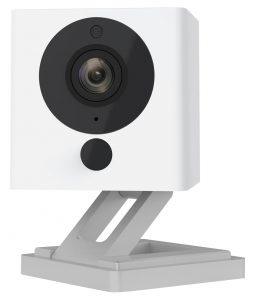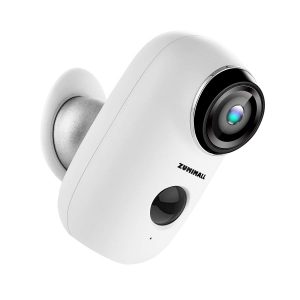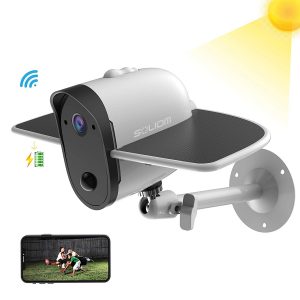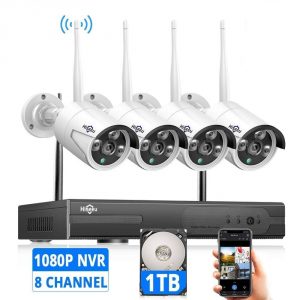Home security cameras give you peace of mind, whether it’s knowing the kids got home from school safe or knowing that no one’s stolen the packages off your porch.
While all security cameras do more or less the same job, the best security cameras enable you to view their footage from anywhere and offer crystal-clear picture quality, day or night.
For those who aren’t familiar with the tech specs of security cameras, sorting out the best from the rest isn’t always easy.
That’s why we put together this guide to the best security cameras.
Lets begin with our top picks for the best home security camera systems in 2021.
Top 4 Best Home Security Cameras for 2021
- Wyze Cam 1080p Indoor Wireless Smart Home Camera with Night Vision: Best Indoor Home Security Camera
- ZUMIMALL Wireless Rechargeable Battery-Powered Home Security Camera: Best Rechargeable Security Camera
- SOLIOM Outdoor Solar-Powered Security Camera: Best Solar Security Camera
- Hiseeu Expandable Eight-Channel Wireless Security Camera System: Best Expandable Security Camera System
Read our reviews below to learn more about our top picks for the best home security cameras and where to buy online.
Home Security Camera System Reviews
Wyze Cam 1080p Wireless Smart Home Camera with Night Vision
Best Indoor Home Security Camera
Check Price at AmazonThe Wyze Cam 1080p Indoor Wireless Smart Home Camera with Night Vision immediately stood out to us because of its nearly 10,000 five-star reviews online. To get that many customers to rave about your product online, you have to be doing something right, and Wyze Cam is doing a lot right, as it turns out. Its camera offers 1080p, full HD video, a 110-degree wide-angle lens, eight-times digital zoom, and night vision.
This compact wireless camera includes a magnetic base and a swivel design, so it’s easy for anyone to install or adjust and you can put it up in your home without drilling any holes in the walls. This makes it a good choice for renters as well as homeowners.
Wyze Cam automatically detects motion and will notify you via its smartphone app so you can see what’s going on from anywhere. All video footage is stored in the Amazon AWS Cloud for 14 days and there’s no subscription cost for you, which is somewhat unusual for this type of camera. If you want to store more footage than that, you can place an SD card in the camera for local storage.
The Wyze Cam 1080p camera was built with the smart-home owner in mind because it also integrates with Amazon Alexa and Google Assistant devices that have a screen. Households with multiple individuals will also appreciate the option to share the video feed with family members so that everyone can stay in the loop about what’s going on back at home.
Learn More & Buy Now at AmazonZUMIMALL Wireless Rechargeable Battery-Powered Home Security Camera
Best Rechargeable Security Camera
Check Price at AmazonThe ZUMIMALL Wireless Rechargeable Battery-Powered Home Security Camera is one of the most versatile on our list. It’s suitable for use indoors or outdoors and it’s battery-powered, so you don’t need to worry about positioning it near an outlet. While some people might worry about having to constantly recharge the battery, the ZUMIMALL camera can last between two and five months when fully charged because it remains in standby mode until it detects motion. You can monitor how much battery your camera has left at any time through the mobile app, so you know right away when it needs recharging, and most customers are impressed with how long it lasts on a single charge.
It’s a good choice for those interested in outdoor cameras because it is IP65 waterproof and it’s wire-free. The 130-degree field of view is wider than most other cameras on this list, so you can cover a large area with a single camera. The only slight downside is its night vision. It only lets you see up to 32 feet in the dark, which is not quite as powerful as the NETVUE camera.
You can view the live feed from the mobile app at any time, but ZUMIMALL charges you to store any footage. If you don’t want to do this, you can always place an SD card in the camera for local storage. It doesn’t integrate with smart-home devices, but it does include a built-in speaker so that you can talk to anyone who shows up on your camera.
Learn More & Buy Now at AmazonThe SOLIOM Outdoor Solar-Powered Security Camera is an eco-friendly alternative to the NETVUE camera for those who don’t want to be hindered by cords or have to worry about recharging a battery. As long as you place the SOLIOM camera in an area that sees a lot of sunlight, you’ll have power all day and all night. In the unlikely event that the camera runs out of power, you can charge it by plugging it into an outlet.
The IP66 weatherproof camera offers 1080p video with night vision that rivals the NETVUE camera, enabling users to see objects up to 49 feet away. Its 160-degree wide-angle lens is the best of any camera on this list, so the SOLIOM camera is worth considering if you plan to cover a large area, like your entire backyard, and want as few cameras as possible. All video is viewable through the mobile app, which can have up to eight people simultaneously viewing the footage at one time. There’s also a microphone and speaker built into the camera to allow for two-way talk.
SOLIOM handles video storage differently than most of the other companies on this list. Users can save up to 20 recorded videos on the cloud per day with a maximum video length of eight seconds. Additional cloud storage will cost you or you can install a micro SD card for virtually unlimited local storage.
Learn More & Buy Now at AmazonHiseeu Expandable Eight-Channel Wireless Security Camera System
Best Expandable Security Camera System
Check Price at AmazonSometimes, one security camera just isn’t enough and when it’s not, the Hiseeu Expandable Eight-Channel Wireless Security Camera System is one of your best choices. It includes four wireless security cameras, with the option to add four additional cameras if you choose. You can use the cameras indoors or outdoors. They are waterproof and function in a variety of temperatures ranging from -13 degrees Fahrenheit to 122 degrees Fahrenheit. The Hiseeu cameras’ night vision is the best of any camera on this list with a maximum distance of 65 feet.
While you can remotely view the camera’s footage from a mobile app like you can with every other camera on this list, the Hiseeu cameras also include a local storage device that enables you to save up to 1 TB of video on it at a time. This is ideal for businesses and for homeowners who want to record new footage without worrying about overwriting the old footage.
Users are pleased with the 1080p picture quality and how easy it is to set up the cameras, but if it has one downfall, it’s the narrow field of view, which is only 78 degrees. That means you’ll need more cameras to cover a larger area than you would with one of the other cameras on this list. But with four included in a set, this should be plenty to get you started. Hiseeu backs all of its cameras with a one-year warranty, so in the unlikely event that they break down, you won’t have to pay any money to replace them.
Learn More & Buy Now at AmazonHow We Chose the Best Security Cameras
We chose the best security cameras based on their video quality, camera type, ease of use and integration features.
Video Quality
The most important feature when choosing any security camera is its video quality because if the video is grainy and it’s difficult to make out what it’s showing, then it’s not doing what you wanted it to do in the first place. Video quality varies by camera. Cheaper security cameras may only offer 480p video while the best cameras will offer 1080p. Field of view is also important because it dictates how wide of an area the camera can cover and consequently, how many cameras you need to fully cover the area you want to surveil.
You should also look for a camera that has night vision, especially if you plan to use the camera outdoors, so that you can clearly see anything that shows up on the camera at any hour of the day or night. Some dim light conditions won’t activate the night vision so you also must look into how well the camera operates in low-light conditions. This is usually determined by the aperture size where a wider aperture provides a better-quality image in poor lighting.
Camera Type
Security cameras can be hardwired into the home or they can be wireless. Some rely on traditional power, some on batteries, and some on solar power. There are tradeoffs to each type. Solar cameras might not perform well on cloudy days without a backup power source. Battery-powered cameras require periodic recharging and hardwired cameras will raise your electricity bill.
The camera type you choose also affects the ease of the installation process. Hardwired cameras can be a challenge to install if you’re not particularly mechanical while many wireless cameras just require you to plug the camera in, position it where you want it to go, and connect it to your WiFi network.
Your living situation might also dictate the type of camera you can have. If you don’t own your home, your landlord may not approve of your drilling holes and installing hardwired cameras in their building.
Ease of Use
Some security cameras are easier to set up and use than others. Yours should include an instruction manual with detailed instructions about how to set yours up and test it. Many security cameras now come with apps so you can access the live video feed or see the latest activity no matter where you are. But others require you to insert an SD card and then remove the card and insert it into a computer to view the footage. You’re better off going with a camera that includes a mobile app if your primary reason for purchasing a security camera is to monitor your home while you’re away.
Integration
The best security cameras should be able to integrate with other cameras of the same brand so that you can expand your network to monitor your entire house if you choose. Some security cameras also integrate with smart-home devices like Amazon Alexa and Google Home. Not everyone will have need of these services, but as the smart-home movement gains more and more steam, security cameras that can integrate with these other devices will probably become more common.
What You Should Know Before Buying a Security Camera
Here are a few things you should know before you buy a home security camera.
Pet owners need to be careful about the type of security camera they choose.
Many security cameras are motion-activated these days and they’ll notify you the second they sense motion within their field of vision. But this can get irritating for pet owners who start getting alerts every time their dog or cat walks across the living room. That doesn’t mean you can’t get a motion-activated camera though.
To combat this problem, many security cameras give users the option to adjust their sensitivity levels so they don’t react to every little thing. You can also adjust the angle of the camera so that it doesn’t detect motion that’s as close to the ground. That way, it might pick up a person walking into the room but it should overlook a smaller dog or cat.
You might have to pay if you want long-term cloud storage.
Some security cameras include a few days’ worth of free cloud storage while others don’t include any. But if you want mobile access to footage more than two weeks old, you’ll most likely have to sign up for a paid subscription plan with your camera’s manufacturer. This is because the cloud storage is not free and the company must pay a service like Amazon AWS Cloud to house all of your footage, so it passes that cost onto you.
You might not feel the need to store your footage in the cloud for extended periods of time, in which case you don’t have to worry about a monthly fee. Another alternative for those who don’t want a monthly cost is to store your footage locally on an SD card. This will enable you to record your footage for longer periods of time, but you won’t have the convenience of being able to view the footage from anywhere and you will have to remember to periodically change the SD card.
Weather-resistant cameras aren’t the same as waterproof cameras.
Those interested in outdoor security cameras need to stay mindful of the difference between weather-resistant and waterproof cameras. Waterproof cameras can withstand direct contact with rain, snow, and other severe weather. Usually, they have an IP rating of 66 or higher. These cameras are the type of cameras you want if you’ll be using them in uncovered areas.
Weather-resistant cameras are suitable for use outdoors, but they could get damaged if subjected to prolonged, direct contact with rain or snow, so they’re best used in covered areas, like on a porch. These types of cameras should have an IP rating of at least 44.
Bottom Line
Home security cameras share many of the same features, but it’s the little things that set them apart, like their video quality, field of view and quality of construction.
Give all of our top picks a look before you decide which one is right for you.
Compare the Best Home Security Camera Systems for 2021
- Wyze Cam 1080p Indoor Wireless Smart Home Camera with Night Vision: Best Indoor Home Security Camera
- ZUMIMALL Wireless Rechargeable Battery-Powered Home Security Camera: Best Rechargeable Security Camera
- SOLIOM Outdoor Solar-Powered Security Camera: Best Solar Security Camera
- Hiseeu Expandable Eight-Channel Wireless Security Camera System: Best Expandable Security Camera System



